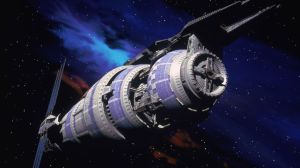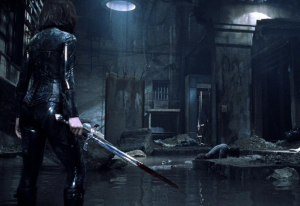The science fiction of the 1990s was forged in a decade of profound technological transition. As the handmade grit of the 80s gave way to the digital dawn of a new millennium, filmmakers were suddenly armed with revolutionary tools. The rapid advancement of computer-generated imagery allowed creators to realize worlds and creatures that were previously confined to the imagination, pushing the boundaries of cinematic possibility. Fortunately, this leap in technology did not overshadow storytelling but amplified it, giving directors the ability to explore complex ideas with unprecedented visual flair, building new digital tools that would help Hollywood to enter its CGI era.
Videos by ComicBook.com
In addition to technological advancements, the 1990s saw a definitive shift in societal concerns. Post-Cold War anxieties evolved, moving from nuclear paranoia to worries over genetic engineering, corporate control, and the very nature of reality itself. This resulted in a collection of films that elevated the genre’s place in the popular imagination, proving sci-fi could be a powerful vehicle for mainstream success. Based on their overall quality and their unquestionable legacy, here’s our pick for the 10 best sci-movies of the 1990s.
10) Total Recall
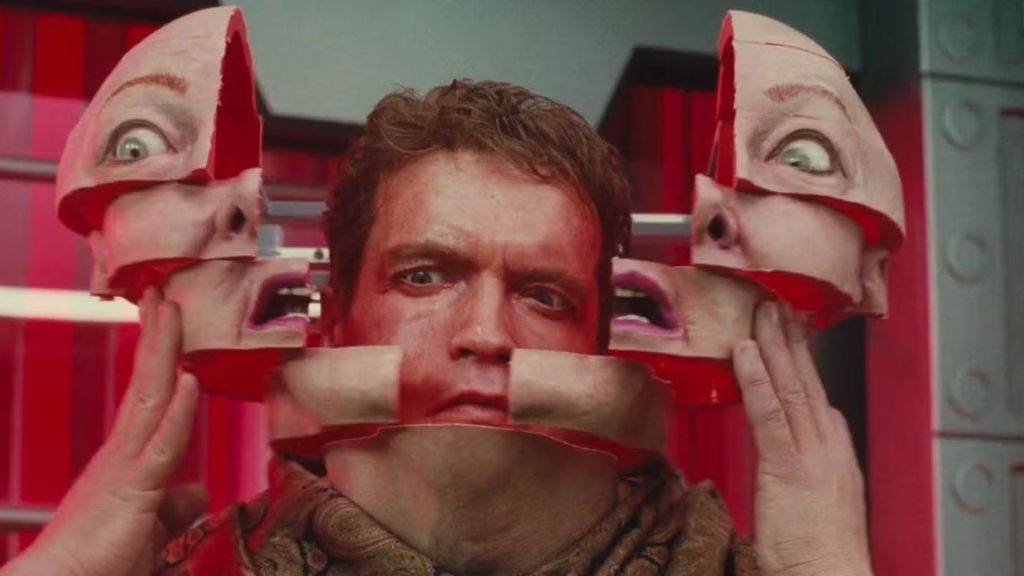
Paul Verhoeven’s Total Recall launched the decade with a blend of brutal action and psychological intrigue. The story centers on Douglas Quaid (Arnold Schwarzenegger), an Earthbound laborer who longs for a more meaningful life. When he purchases a memory implant from Rekall, a company that specializes in giving customers simulated adventures, the procedure triggers violent memories buried deep inside his mind. Suddenly, Quaid finds himself hunted by assassins, pursued by a ruthless corporation, and drawn toward a rebellion on Mars. Total Recall never fully answers whether he is a sleeper agent rediscovering his past or an ordinary man lost inside an elaborate fantasy, and that constant uncertainty drives the tension from start to finish.
What made Total Recall unforgettable was its willingness to go all-in on both concept and spectacle. The Martian colonies are rendered as grim industrial settlements where mutants live under the heel of corporate overlords, a setting that gives the story a political edge. Furthermore, Verhoeven leaned heavily on inventive practical effects, from grotesque prosthetics to the surreal sight of human bodies convulsing in Mars’ atmosphere. Schwarzenegger provides the performance that carries the story forward, but it is the uneasy mix of paranoia, violence, and outlandish imagery that secured Total Recall’s legacy.
9) 12 Monkeys
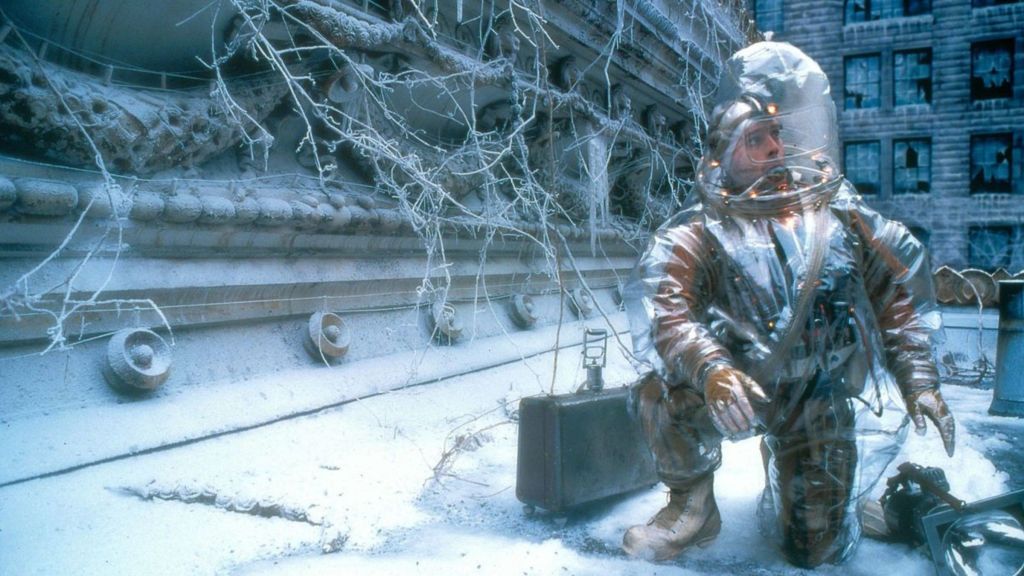
Terry Gilliam’s 12 Monkeys approached time travel as a tragic puzzle rather than a triumphant adventure. The film follows James Cole (Bruce Willis), a prisoner from a plague-ravaged future who is sent back in time to gather information about the virus that destroyed civilization. His mission quickly spirals into chaos as his warnings go unheeded, his sanity comes into question, and his own memories blur the line between reality and delusion. Along the way, he encounters Jeffrey Goines (Brad Pitt), the unstable son of a wealthy industrialist, whose erratic behavior hints at a dangerous connection to the coming catastrophe.
Unlike many of its contemporaries, 12 Monkeys prioritizes its philosophical questions over spectacle. Inspired by the French short film La Jetée, its story is a bleak meditation on fate, sanity, and the unreliability of memory. In addition, Gilliam’s direction emphasized claustrophobic sets, distorted camera angles, and a sense of constant disorientation, mirroring Cole’s unraveling state of mind. Finally, Willis delivers a career-best performance in 12 Monkeys as the vulnerable and confused Cole, while Pitt is unforgettable as the manic eco-terrorist Jeffrey.
8) Contact
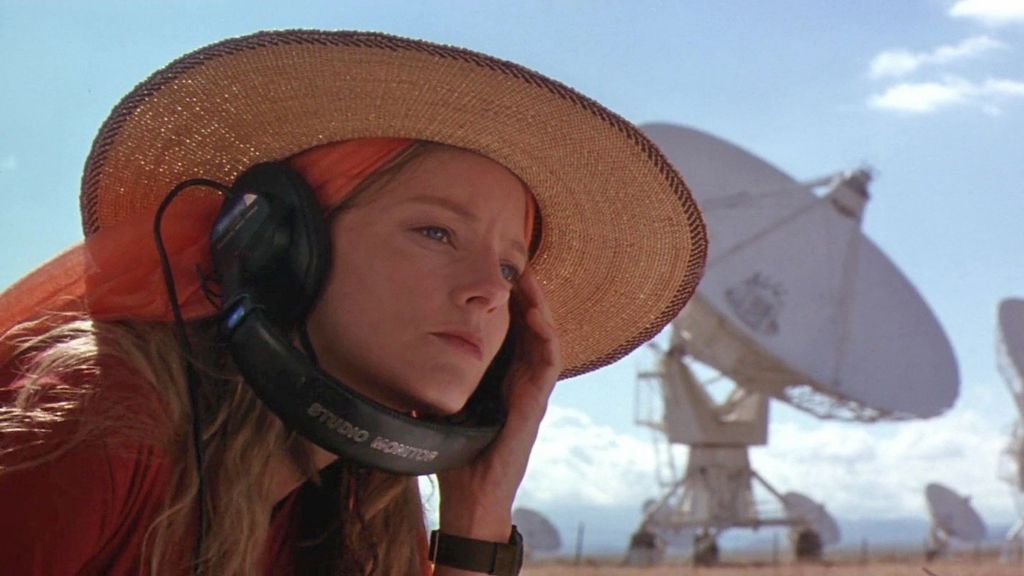
Robert Zemeckis’s Contact stands apart from the decade’s other alien-centric films by treating the subject with profound seriousness and intellectual curiosity. The film centers on Dr. Ellie Arroway (Jodie Foster), a driven radio astronomer who discovers an intelligent signal from deep space. What follows is a global effort to decipher the message and make humanity’s first contact with an extraterrestrial civilization. Based on this premise, the narrative skillfully balances the scientific process with a deeply personal story, exploring the conflict between faith and reason as Arroway’s discovery challenges the foundations of human belief.
Instead of focusing on spectacle, Contact builds its drama from ideas. The film is a patient and optimistic exploration of humanity’s place in the cosmos, arguing that the search for knowledge is a noble pursuit. Its most powerful moments come from conversations, as characters grapple with the immense philosophical and theological implications of Arroway’s discovery. By grounding its grand science fiction premise in a thoughtful and character-driven story, the film proved that the genre could deliver powerful drama without resorting to action, making it one of the most mature sci-fi films of the 1990s.
7) Dark City
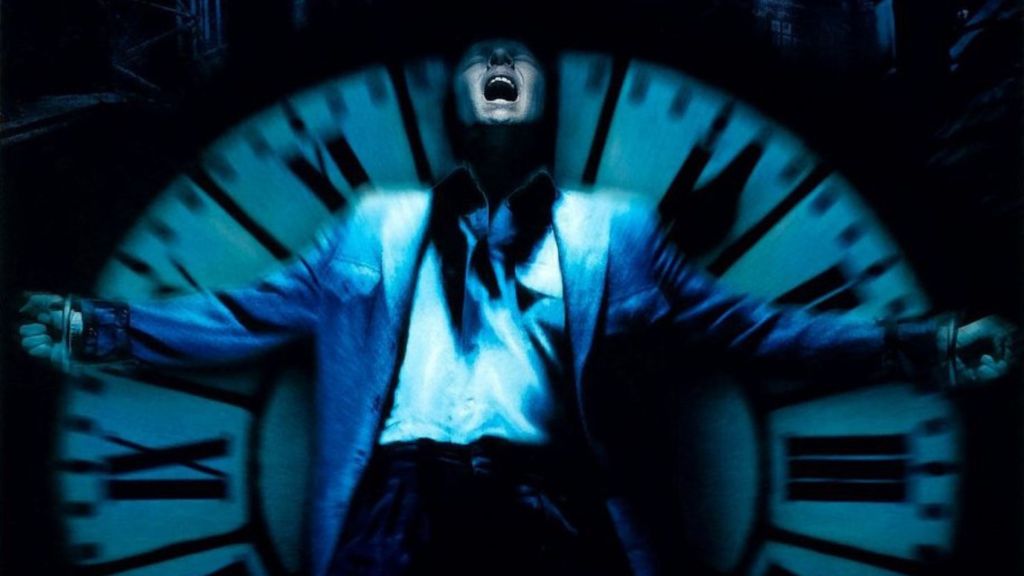
Released a year before The Matrix redefined the genre, Alex Proyas’ Dark City was a visionary neo-noir movie that explored similar themes of manufactured reality and lost identity. The film drops viewers into a perpetually dark metropolis where John Murdoch (Rufus Sewell) awakens in a strange hotel room with amnesia and a dead body. Hunted for a murder he cannot remember, he discovers that the city is a vast experiment run by the Strangers, a group of telekinetic aliens who alter the buildings and their inhabitants’ memories each night. As a result, Murdoch’s quest to uncover the truth becomes a fight to reclaim not just his own past, but the very concept of human individuality.
Dark City is a triumph of world-building and visual style, blending the aesthetics of 1940s film noir with German Expressionism to create a uniquely unsettling atmosphere. The film’s greatest strength is its philosophical narrative, which raises complex questions about what constitutes a soul if memories can be implanted and erased. While it was not a commercial success upon release, its ambition and originality secured its legacy, with Dark City remaining a crucial piece of 1990s sci-fi.
6) Gattaca
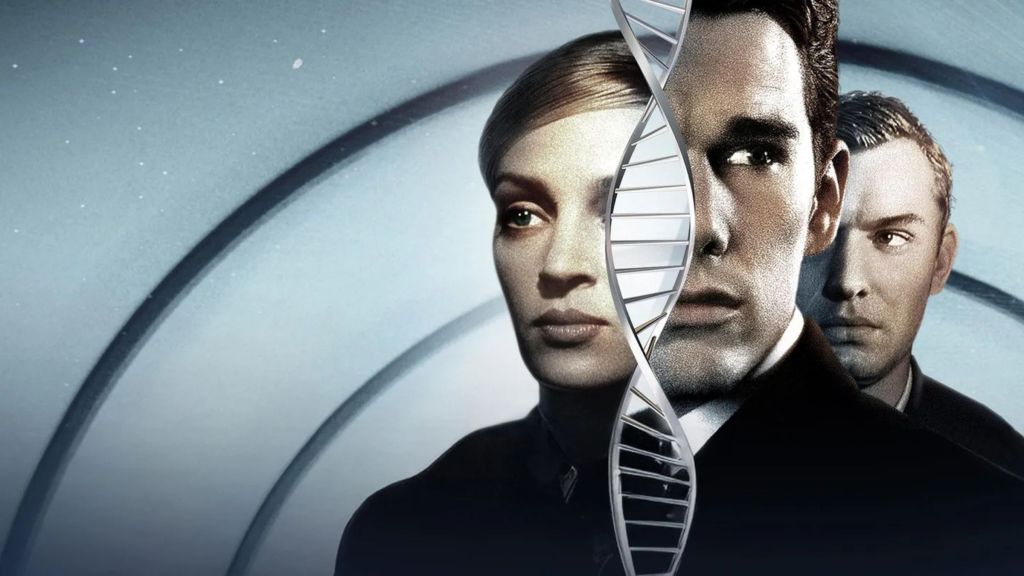
Andrew Niccol’s directorial debut, Gattaca, is a thoughtful and stylish thriller that explores a future shaped by genetic engineering. In this society, individuals are defined by their DNA, with the genetically “valid” receiving every advantage while the “in-valid” are relegated to menial jobs. The story follows Vincent Freeman (Ethan Hawke), an in-valid who dreams of space travel and assumes the identity of a genetically superior but paralyzed man named Jerome Morrow (Jude Law). His deception allows him to enter the elite Gattaca Aerospace Corporation, but he lives in constant fear of being exposed by a stray eyelash or a single drop of blood.
Unlike many sci-fi films of its time, Gattaca does not rely on action or special effects. Instead, its tension is purely psychological, built on the constant risk of discovery in a world obsessed with biological perfection. In addition, the film’s minimalist aesthetic creates a chillingly sterile environment that reinforces its themes of conformity and discrimination. Gattaca captured the emerging anxieties of the 1990s surrounding the Human Genome Project, delivering a powerful and enduring statement about the unquantifiable strength of the human spirit in the face of genetic determinism.
5) Jurassic Park
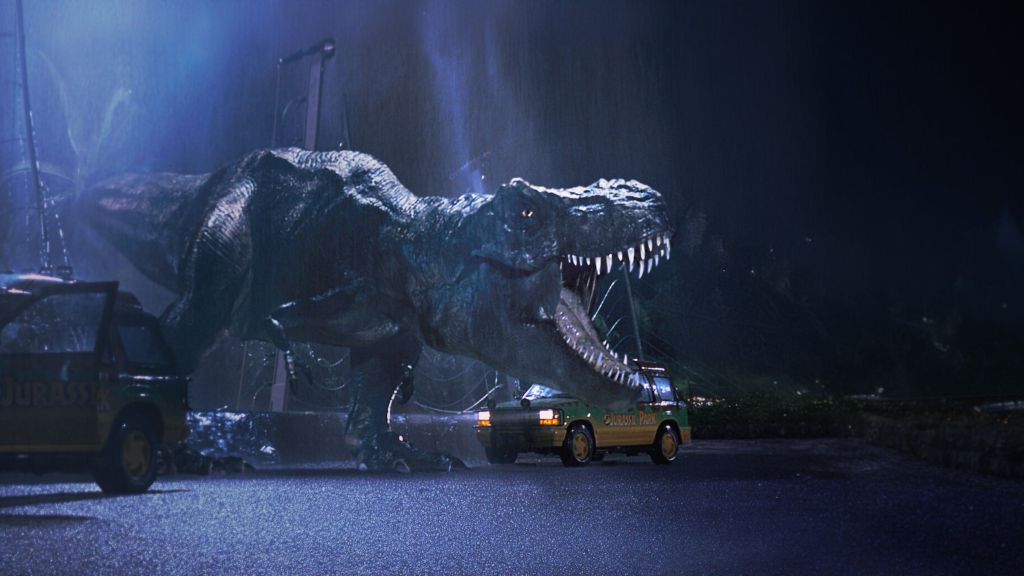
Steven Spielberg’s Jurassic Park was a cinematic event that fundamentally changed the landscape of blockbuster filmmaking. The film transports audiences to a remote island where billionaire John Hammond (Richard Attenborough) has brought dinosaurs back to life through genetic engineering. When a group of scientists is invited for a preview tour, a catastrophic system failure unleashes the prehistoric creatures, turning a theme park of wonders into a terrifying fight for survival. More than just an adventure film, the story serves as a cautionary tale about the arrogance of humanity and the unpredictable power of nature.
The movie’s true legacy lies in its revolutionary use of computer-generated imagery. The dinosaurs in Jurassic Park were fully realized characters, moving with a weight and realism that had never been seen before. The first appearance of the Brachiosaurus inspired a sense of genuine awe, while the T-Rex’s rainy debut remains one of the most terrifying sequences in movie history. By seamlessly blending groundbreaking digital effects with masterful suspense, Spielberg created a film that defined the 90s and set a new standard for spectacle that Hollywood continues to chase.
4) Starship Troopers
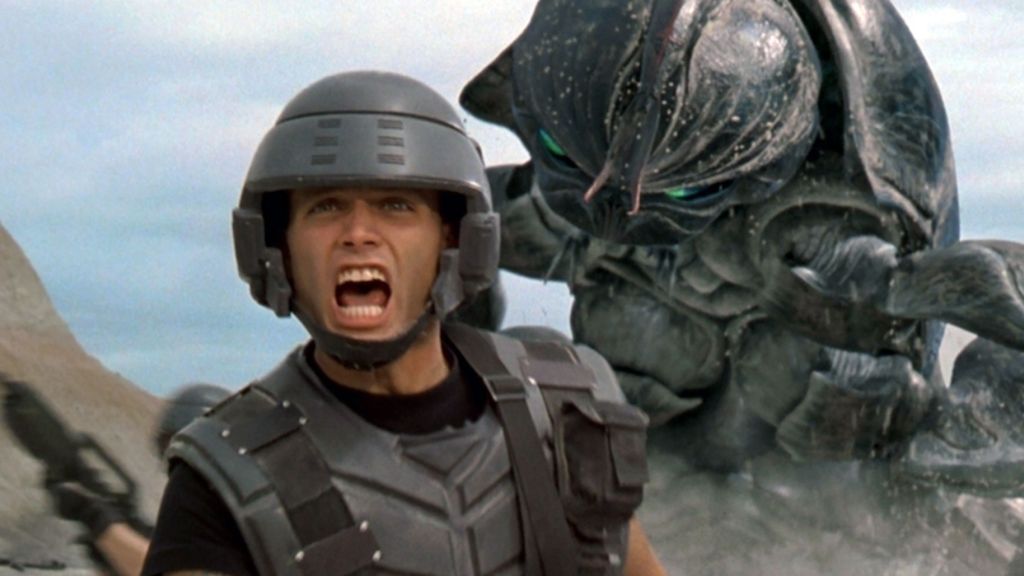
On its surface, Paul Verhoeven’s Starship Troopers is a high-octane action film about futuristic soldiers battling giant alien bugs. The story follows the journey of the young and idealistic Johnny Rico (Casper Van Dien) as he enlists in the military to fight for Earth against an arachnid enemy from across the galaxy. The film is filled with massive-scale battles, gory violence, and the heroic bravado typical of military science fiction. Beneath that surface, however, lies one of the sharpest and most subversive satires of the decade.
Verhoeven uses the framework of a straightforward sci-fi war movie to launch a scathing critique of fascism, propaganda, and militarism. The human society in Starship Troopers is an authoritarian regime where citizenship is earned through military service, and the film’s characters enthusiastically embrace its jingoistic ideology. Mixed with a series of slickly produced propaganda newsreels, the film cleverly mimics the language of totalitarian art without ever winking at the audience. This unapologetic approach makes Starship Troopers‘ satirical commentary on blind patriotism and the glorification of violence all the more powerful, as many fans don’t realize it on a first watch.
3) The Fifth Element
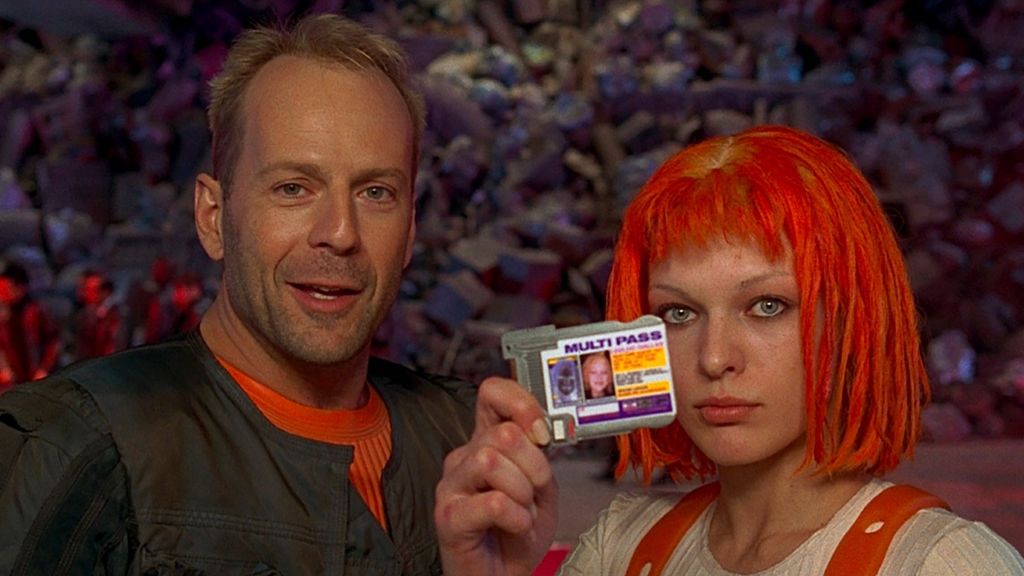
Luc Besson’s The Fifth Element is a dazzling and unapologetically optimistic explosion of color and creativity. Set in a vibrant 23rd-century New York, the film follows Korben Dallas (Bruce Willis), a down-on-his-luck flying cab driver who finds his life turned upside down when a mysterious young woman named Leeloo (Milla Jovovich) crashes into his vehicle. He soon discovers that she is the key to stopping a cosmic evil from destroying all life in the universe. What follows is a wildly imaginative adventure that blends operatic space fantasy with a uniquely French comic book sensibility.
In an era often defined by darker science fiction, The Fifth Element stands out for its sheer joy and visual invention. The world Besson creates is a maximalist vision of the future, brought to life with Jean-Paul Gaultier’s iconic costumes and an eclectic production design. Furthermore, the film is a perfect fusion of high-stakes action, irreverent humor, and a surprisingly heartfelt story about the power of love. Plus, The Fifth Element‘s refusal to take itself too seriously and its commitment to pure spectacle have cemented its status as a beloved cult classic.
2) Terminator 2: Judgment Day
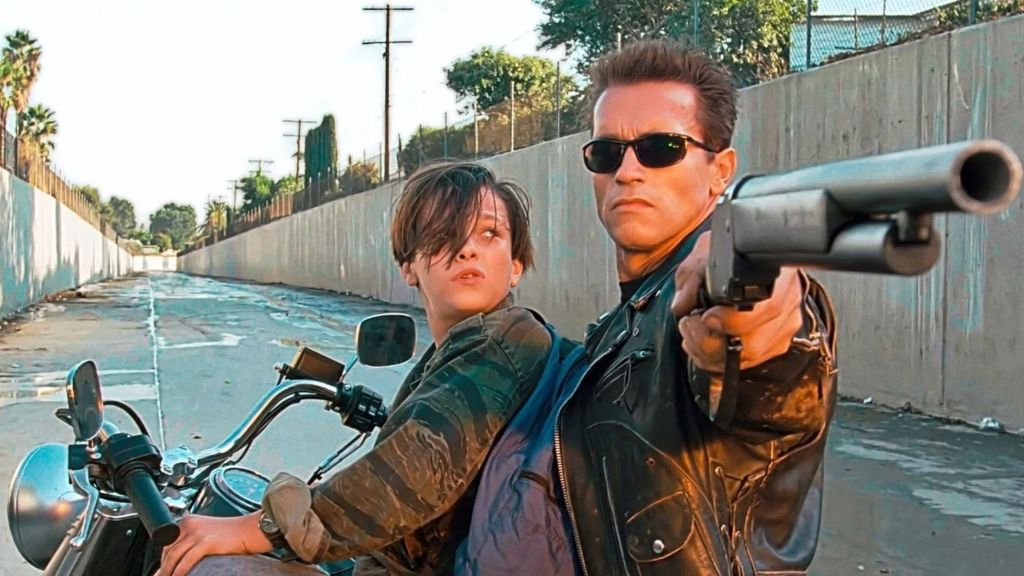
James Cameron’s Terminator 2: Judgment Day took every element of its 1984 predecessor and elevated it to a monumental scale. The film brilliantly inverts the original’s premise by reprogramming the T-800 (Arnold Schwarzenegger) and sending it back in time to protect a young John Connor (Edward Furlong). Their enemy is the T-1000 (Robert Patrick), a far more advanced Terminator made of liquid metal, capable of shapeshifting and forming stabbing weapons. This new threat created a relentless and visually stunning chase movie that pushed the boundaries of what was possible with special effects.
Terminator 2‘s groundbreaking CGI, particularly the morphing abilities of the T-1000, set a new benchmark for visual effects that would influence action cinema for years. Beyond the spectacle, Terminator 2: Judgment Day deepened the franchise’s mythology, exploring powerful themes of fate and humanity through the T-800’s evolution from a killing machine into a surrogate father figure. It was a rare sequel that surpassed the original in every conceivable way, delivering a perfect blend of high-concept science fiction, explosive action, and compelling emotional stakes.
1) The Matrix

Closing out the decade, the Wachowskis’ The Matrix was a cultural landmark that redefined science fiction for a new millennium. The film follows Thomas Anderson (Keanu Reeves), a computer programmer who moonlights as the hacker Neo. His search for the truth leads him to Morpheus (Laurence Fishburne), who reveals that the world he knows is a simulated reality created by intelligent machines to enslave humanity. Armed with this knowledge, Neo begins a journey to discover if he is the prophesied savior destined to liberate humankind.
The Matrix was a perfect synthesis of cyberpunk philosophy, Hong Kong-style martial arts, and cutting-edge visual effects. Its “bullet time” sequences created a new cinematic language for action, while its story tapped directly into the anxieties of the digital age, questioning the nature of reality and control in a world increasingly dominated by technology. Because of that, The Matrix became a phenomenon that permeated every corner of pop culture and fundamentally altered the DNA of science fiction and action movies. As such, it remains the definitive sci-fi movie of the 1990s.
Which other 1990s sci-fi movies do you think deserved a spot on this list? Share your picks in the comments!

